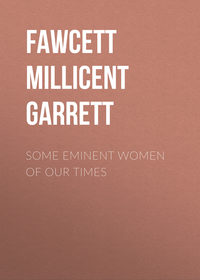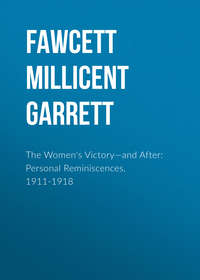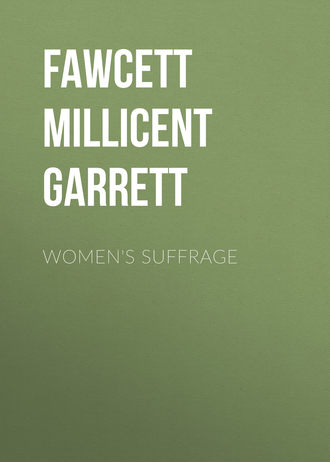 полная версия
полная версияWomen's Suffrage
On the same day Sir Edward Grey, at Alnwick, reiterated his continued support of women's suffrage. In reply to a question, he said: "If that means, am I in favour of a reasonable Bill for giving votes to women, I have always supported that Bill, and I don't think it right to change my opinions because what I believe to be a small minority among women has been very violent and unreasonable." Mr. Winston Churchill, a few days earlier, expressed a similar opinion to that of Sir Edward Grey.
The anti-suffragists are never weary of asserting that women's suffrage has never been before the country as a practical political issue. It is difficult to imagine what being "before the country" consists in, if the foregoing declarations on the part of the leaders of the party in power do not indicate that a question has reached this stage. At the general election of January 1910, 245 candidates mentioned in their election addresses that they supported the extension of the Parliamentary franchise to women.[41] In this election the National Union organised a voters' petition in support of women's suffrage. The signatures, amounting to over 280,000, were nearly all collected on polling day from electors who had just recorded their own vote. In some constituencies, especially in the North of England, hardly a man refused his signature; the polling number was in each case attached to the signature as a means of identification, and as a guarantee of good faith. No objection has ever been made to our petitions, or signatures disallowed, as in the case of some of the anti-suffrage petitions, on the ground that there were pages of signatures all in the same handwriting.
An extremely important event in the development of the suffrage movement in the field of practical politics took place almost simultaneously with the January 1910 election. This was the formation of the Conciliation Committee. It was recognised on all hands that women's suffrage was in an unprecedented Parliamentary position; a large majority of members of Parliament were pledged to it, but it was not backed by either of the great parties, and consequently lacked the driving power to get through the stages necessary to convert a Bill into an Act of Parliament. This was in part due to differences as to the sort of women's suffrage which members of Parliament were prepared to accept. The Liberals objected to a Bill in the old lines based on the removal of the sex disability, dreading that such a measure would be used as a means of multiplying plural voting, and would thus probably tell heavily against the Liberal party. Conservatives and moderate Liberals objected to the immense addition to the electorate which would be caused by adult suffrage. The Conciliation Committee was formed with the view of reconciling these differences, by finding a Bill which all suffragists could support. With the exception of the chairman, the Earl of Lytton, and the Hon. Secretary, Mr. H. N. Brailsford, it consisted entirely of members of the House of Commons favourable to women's suffrage, and representing the parties – Liberal, Conservative, Labour, and Nationalist – into which the House is divided. As the result of the work of this committee a Bill was arrived at, to which all the parties represented on the committee could agree.
The Bill was drafted on the lines of simple Household Suffrage with a clause expressly laying down that marriage was not to be a disqualification. It has never been contended that this is a perfect Bill; it was the result of a compromise between the different parties in the House of Commons. The Conservatives and moderate Liberals objected to adult suffrage; the Liberals and their allies objected to the old suffrages being simply opened to women for the reasons just indicated; therefore, in deference to Liberal objections, the freeholders, occupiers, service, university, lodger, and other franchises were abandoned in the case of women, and in deference to Conservative objections adult suffrage was not proposed. The Bill which was agreed upon was based upon the democratic principle of Household Suffrage, of which the country had had more than forty years' experience as far as women were concerned in municipal elections. The principle of the Conciliation Bill is to make Household Suffrage a reality. Mrs. Humphry Ward condemns this measure as "absurd."[42] Wherein its absurdity consists she does not explain. Household Suffrage was the main sheet anchor of all the great Reform Bills of the last century; it is the basis of most of the local franchises. It is by far the most important, numerically, of all the various existing franchises. An interesting return is published every year of the total number of Parliamentary voters, indicating the qualifications under which they vote. That dated February 28, 1911, shows that in the whole United Kingdom there were 7,705,602 registered electors; of these 6,716,742 voted as occupiers and householders, while less than 1,000,000 represented the total of all the other franchises put together. The Bill, therefore, which gives women Household Suffrage admits them to by far the most important suffrage which men enjoy. Personally many suffragists would prefer a less restricted measure, but the immense importance and gain to our movement in getting the most effective of all the existing franchises thrown open to women cannot be exaggerated. This was immediately appreciated by all the suffrage societies and also by the Women's Liberal Federation, all of which gave hearty and enthusiastic support to the Bill, known as the Conciliation Bill, to extend Household Suffrage to women.[43]
The Conciliation Committee and the suffrage societies successfully refuted the charge made against the Conciliation Bill that it was undemocratic. It would, if passed, enfranchise approximately 1,000,000 women, and it was proved conclusively, by careful analysis of the social status of women householders in a large and representative group of constituencies, that the overwhelming majority of these would be working-class women. In London (1908) the proportion of working-class women was shown to be 87 per cent., in Dundee (1910), 89 per cent., Bangor and Carnarvon (1910), 75 per cent. The average in about fifty representative constituencies, where the investigation was conducted under the auspices of the Independent Labour Party, was shown to be 82 per cent. The Bill gave no representation to property whatever. The only qualification which it recognised was that of the resident householder.
This Bill, drawn in such a way as not to admit of amendment, was introduced by Mr. Shackleton, Labour member for Clitheroe in the new Parliament, elected in January 1910. Two days of Government time were given for its second reading in July of that year. It was the first time a Women's Suffrage Bill had been the subject of a full-dress debate. Parliamentary leaders on both sides took part in it, and the voting was left to the free judgment of the House of Commons. Among the supporters of the Bill were Mr. (now Viscount) Haldane, Mr. Arthur Balfour, Mr. Philip Snowden, and Mr. W. Redmond, while among its opponents were Mr. Asquith, Mr. Austen Chamberlain, Mr. F. E. Smith, and Mr. Haviland Burke. Mr. Lloyd George and Mr. Winston Churchill also vehemently opposed the Bill, not on the ground of opposition to women's enfranchisement, but because of the alleged undemocratic character of this particular measure, and because it was introduced in a form that did not admit of amendment. The division resulted in the large majority of 110 for the second reading, a figure in excess of anything which the Government could command for their chief party measures. An analysis of the division list gave the following results, omitting pairs of whom there were 24: —
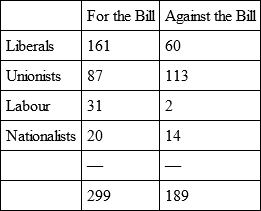
Notwithstanding this large majority the Bill was destined to make no further progress that session; but the interval between the second reading and the assembling of Parliament for the autumn session was utilised for the organisation of the most remarkable series of public demonstrations of an entirely peaceful character which have probably ever been held in this country in support of any extension of the suffrage. It was estimated that no fewer than 4000 public meetings were held in the four months between July and November; the largest halls all over the country were filled again and again; the Albert Hall was filled twice in one week; the largest meeting ever held in Hyde Park, when more than half a million of people were assembled, was organised by the Women's Social and Political Union. It was at this moment that the remarkable movement, already referred to in Chapter V., was begun – the series of petitions from Town and other locally elected Councils for the speedy passing into law of the measure known as the Conciliation Bill. The city of Glasgow led the way with a unanimous vote of its Council.
During this autumn Sir Edward Grey, Mr. Birrell, and Mr. Runciman made public declarations in support of women's suffrage, and said that in their opinion facilities for the further progress of the Bill and its passage into law ought to be provided in 1911. A few months later Lord Haldane said he hoped "the Bill would pass quickly." The most important practical gain for the suffrage movement was, however, achieved in November 1910. Early in the month Mr. Asquith had announced the intention of his Government again immediately to dissolve Parliament; and on the 22nd, in reply to a question in the House, he said that the Government would, "if they were still in power, give facilities in the next Parliament for effectively proceeding with a [Women's Suffrage] Bill, if so framed as to admit of free amendment." These words gave to suffragists the key which enabled them to unlock the doors which barred their progress. The more astute political minds among the anti-suffragists immediately saw the importance of this promise. The Times, November 24, announced that it made women's suffrage an issue before the country at the coming election, and added, "If the election confirms the Government in power the new Parliament will be considered to have received a mandate on the subject of women's suffrage."[44]
The feather-heads could see nothing of any importance in this promise, and the Anti-Suffrage Review allowed itself the treat of entitling an article "Nod and wink promises." All suffragists of any experience, however, felt that their cause had received an immensely important impetus, and that they were gaining ground not by painful inches but by furlongs. When the session of 1911 opened, the Conciliation Committee was again formed, and good luck smiled upon its members, for three of them drew the first, second, and third places in the ballot, and thus secured an excellent place for the second reading of the Bill. The member in charge was Sir George Kemp, who sits for N.W. Manchester. The Bill was, of course, drawn so as to admit of free amendment. The second reading was on May 5, 1911, and there voted for it 255, and against it 88. The majority of 110 in 1910 had thus grown in 1911 to 167. There were 55 pairs; but the number of members wishing to pair in favour of the Bill was so great that the demand could not be satisfied. Six of these wrote to the papers explaining their position. Adding the pairs, and those who desired to pair, but were unable to do so, the analysis works out as follows: —
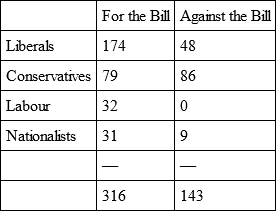
Almost immediately after this an announcement was made from the front bench that Mr. Asquith's promise of the previous November that an opportunity should be given for proceeding with the Bill in all its stages would be fulfilled during the session of 1912. There was for a time some fencing and difficulty over the point whether this promise applied exclusively to the Conciliation Bill or to any Women's Suffrage Bill which might obtain a place in the ballot for second reading. All doubt on this subject was finally set at rest on August 23, by a letter from Mr. Asquith to Lord Lytton, in which the Prime Minister stated that the promises were given in regard to the Conciliation Bill, and that they would be strictly adhered to both in letter and in spirit.
This, then, was the position of the suffrage question between the close of the summer session and the beginning of November 1911. All the suffrage societies were working in complete harmony on the same lines and for the same Bill. The militant societies had suspended militant tactics, and also their anti-government election policy. The Women's Liberal Federation, whose co-operation was of great and obvious importance, were uniting their efforts with those of the suffrage societies, when on November 7, a bombshell was dropped among them in the speech of the Prime Minister, replying to a deputation from the People's Suffrage Federation, who presented a memorial asking for adult suffrage. Mr. Asquith then announced that it was the intention of his Government to introduce during the coming session (1912) the Electoral Reform Bill, which he had foreshadowed in 1908, that all existing franchises would be swept away, plural voting abolished, and the period of residence reduced. The new franchise was to be based on citizenship, and votes were to be given "to citizens of full age and competent understanding." But no place was found within the four comers of the Bill for the enfranchisement of women. Mr. Asquith reiterated his promise of facilities for the Conciliation Bill, and then merely dismissed the subject of women's suffrage with the remark that his opinions upon it were well known. If it had been his object to enrage every women's suffragist to the point of frenzy, he could not have acted with greater perspicacity. Years of unexampled effort and self-sacrifice had been expended by women to force upon the Government the enfranchisement of women, and when the Prime Minister spoke the only promise he made was to give more votes to men. Mrs. Bernard Shaw exactly expressed the sentiments of women's suffragists, whether militant or non-militant, when she wrote that Mr. Asquith's speech filled her with "an impulse of blind rage"; she felt she had been personally insulted, and that he had said to her in effect "that the vilest male wretch who can contrive to keep a house of ill-fame shall have a vote, and that the noblest woman in England shall not have one because she is a female" (The Times, November 21, 1911).
It is never safe to act under an impulse of blind rage, and very soon a closer knowledge of the actual facts surrounding and explaining the situation brought the conviction home to many of us, indeed it may be stated to the whole body of suffragists with one important exception,[45] that the new situation created by Mr. Asquith's speech, so far from decreasing the chances of success for women's suffrage in 1912 had very greatly strengthened them. First of all we were cheered by the courageous and outspoken remonstrances on behalf of women made by The Manchester Guardian and The Nation. The Manchester Guardian, (November 9, 1911), said that the exclusion of women would be "an outrage and, we hope, an impossibility… No Government calling itself Liberal could so far betray Liberal principles without incurring deep and lasting discredit and ultimate disaster." The Labour party, through its chairman, Mr. Ramsay MacDonald, M.P., also spoke out very plainly. "We shall take care," he said, "that the Manhood Suffrage Bill is not used to destroy the success of the women's agitation, because we have to admit that it has been the women's agitation that has brought the question of the franchise both for men and women to the front at the present time." Like other experienced Parliamentarians, he advised us to hold the Government to their pledges about the Conciliation Bill until we had actually secured something better (The Manchester Guardian, November 9, 1911).
Then we began to hear from those we knew we could trust of meetings that were being held of suffrage members of the Government to decide upon a plan of action, so as to secure for women a better chance of enfranchisement through the operation of an amendment to the Government Bill than we could have if we relied upon the Conciliation Bill alone. An invitation was received from the Prime Minister to all the suffrage societies to attend a deputation on the subject. The full report of that deputation was in all the papers of November 18, 1911. It is sufficient here to say that when Mr. Asquith spoke he acknowledged the strength and intensity of the demand for women's suffrage, and admitted that in opposing it he was in a minority both in his Cabinet and in his party; finally, and most important of all, he added that although he could not initiate and propose the change which women were seeking, he was prepared to bow to, and acquiesce in, the deliberate judgment of the House of Commons, and that it was quite in accordance with the best traditions of English public life that he should act thus. A great majority of those who were present thought that the Prime Minister had recognised that women's suffrage was inevitable, and that it would not be for the benefit of his party that he should withstand to the last this great advance in human freedom.
Mr. Asquith gave positive and definite answers in the affirmative to the four questions which were asked by the National Union of Women's Suffrage Societies: —
1. Is it the intention of the Government that the Reform Bill shall go through all its stages in 1912?
2. Will the Bill be drafted in such a way as to admit of any amendments introducing women on other terms than men?
3. Will the Government undertake not to oppose such amendments?
4. Will the Government regard any amendment enfranchising woman which is carried as an integral part of the Bill in all its stages?
Almost immediately after this Mr. Lloyd George authorised the public announcement that he was himself prepared to move the women's suffrage amendment to the Reform Bill, or, if it was thought best in the interests of women's suffrage, he would be pleased to stand aside in favour of Sir Edward Grey or of some leading Conservative. It has been indicated very plainly that the amendment Mr. Lloyd George himself favours will be one for the enfranchisement of householders and wives of householders. A Bill to this effect has been some time before Parliament, and is familiarly known as Dickinson, No. 2; it enacts that when a husband and wife reside together in premises for which, under the existing law, the husband is entitled to vote, the wife shall also be entitled to vote as a joint-occupier. There is a parallel for a provision of this kind in the existing franchise law of Norway. Sir Edward Grey, Mr. Lloyd George, Mr. Ramsay MacDonald, and other suffragists in and out of the House of Commons concur in the opinion that the present situation gives our movement almost a certainty of success in the session of 1912.
Mr. Lloyd George opened his campaign for women's suffrage in an important speech at Bath on November 24, 1911. It was a men's meeting, the occasion being the Annual Congress of the Liberal Federation. He was received with enthusiasm and made a powerful and well-reasoned speech in favour of the enfranchisement of women. This was followed in December 16 by a meeting in London of the Women's Liberal Federation addressed by Sir Edward Grey and Mr. Lloyd George.[46] The former dwelt upon the reasons which weighed with him in favour of the representation of women, and indicated that the amendment to the Reform Bill which he favoured would be on the lines of Women's Suffrage in Norway, i. e. not Adult Suffrage, but suffrage for women householders, including wives (as indicated on p. 81). Mr. Lloyd George dwelt on the essential partnership of men and women in all the greatest things in human life, and urged that this partnership should be extended to politics. Thus the year 1911 ended with every prospect of a hard won Parliamentary victory for women's suffrage in 1912. Women's suffrage always has been, and will remain, a non-party question. The Conservative and Unionist Women's Franchise Association is working as keenly as any of the other suffrage societies. We shall not succeed in 1912 unless we are successful in attracting the support of Conservatives as well as Liberals and Radicals. To aid us in the final struggle it is of no little value that we have the promise of a week's Government time for the Conciliation Bill, if our hopes of carrying a satisfactory amendment to the Reform Bill should be frustrated.
We are on the eve of the fulfilment of our hopes. The goal towards which many of us have been striving for nearly half a century is in sight. I appeal to each and all of my fellow-suffragists not to be over confident, but so to act as if the success of the suffrage cause depended on herself alone. And even if our anticipated victory should be once more delayed, I appeal to them again not to despond but to stand firm and fast, and be prepared to work on as zealously and as steadfastly as of old.
A splendid lesson reaches us from America. The great victory for women's suffrage in California in October 1911 was at first reported to be a defeat. A group of the leaders, including Dr. Anna Shaw, had been sitting up to the small hours of the morning in the New York Women's Suffrage Office, receiving news from California, 3000 miles away. The first returns were so bad that it looked as if nothing could save the situation; and the grief was all the greater because victory had been confidently counted on. Dr. Anna Shaw went away in deep despondency. Presently she came back saying she could not sleep, and walking backwards and forwards in the office, she explained a new plan of campaign which her fertile brain had already originated. This is the spirit which is unconquerable and it is our spirit too.
He who runs may read the signs of the times. Everything points to the growing volume and force of the women's movement. Even if victory should be delayed it cannot be delayed long. The suffragists ought to be the happiest of mankind, if happiness has been correctly defined as the perpetual striving for an object of supreme excellence and constantly making a nearer approach to it.
A BRIEF REVIEW OF THE WOMEN'S SUFFRAGE MOVEMENT SINCE ITS BEGINNING IN 1832
Reprinted with abbreviations, by kind permission of the National Union of Women's Suffrage Societies 14 Great Smith Street, Westminster
HISTORY OF THE WOMEN'S SUFFRAGE MOVEMENT IN PARLIAMENTIn 1832, the word "male" introduced into the Reform Act (before "person") restricted the Parliamentary franchise to men, and debarred women from its use.
1850, Lord Brougham's Act came into operation, which ruled that, in the law of the United Kingdom, "words importing the masculine gender shall be deemed to include females, unless the contrary is expressly provided."
In 1867, John Stuart Mill moved an amendment to the Representation of the People Bill (Clause 4), to leave out the word "man" and substitute "person." This amendment was lost by a majority of 123.
In 1868, the judges in the Chorlton v. Lings case ruled that in the case of the Parliamentary franchise, the word "man" does not include "woman" when referring to privileges granted by the State.
Since 1869, Bills and Resolutions have been constantly before the House of Commons. Debates took place in 1870 (twice), 1871, 1872, 1873, 1875, 1876, 1877, 1878, 1879, 1883, 1884, 1886, 1892, 1897, 1904, 1905, 1908 (twice), 1910, 1911.
Altogether, besides resolutions, thirteen Bills have been introduced into the House of Commons, and seven passed their second reading, i. e. in the years 1870, 1886, 1897, 1908, 1909, 1910, 1911. There has been a majority in the House of Commons in favour of women's suffrage since 1886.
Formation of the Conciliation CommitteeIn 1910 the Conciliation Committee was formed in the House of Commons. With the exception of the chairman, the Earl of Lytton, and the Hon. Secretary, Mr. Brailsford, it consisted of members of the House of Commons representative of all the political parties. This committee drafted a Bill which extended the Parliamentary franchise to women householders (about one million in all). This Bill, popularly known as the "Conciliation Bill," was introduced into the House of Commons by Mr. Shackleton. Two days of Government time were allotted to it, and on July 13, 1910, it passed its second reading by a majority of 110, a larger majority than the Government got for any of its measures, including the Budget.


